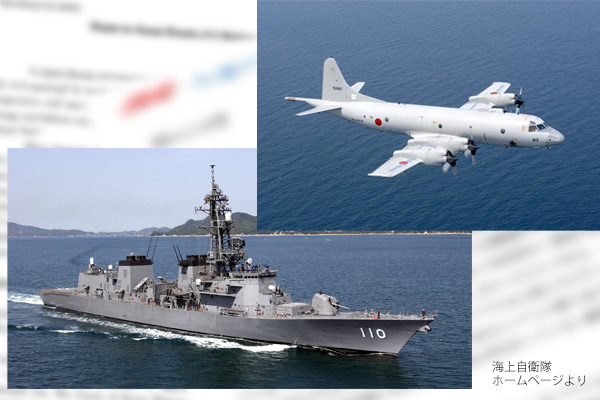On January 10, Japan’s Defense Minister Taro Kono ordered a team of a destroyer and patrol aircraft from the Maritime Self-Defense Force to go to Middle Eastern waters.
Most of opposition parties raise objection to the mission because of the growing U.S.-Iran tensions, but they do not answer the question of if Japan is allowed to avoid participating in securing the Middle Eastern sea-lanes on which it depends for about 90% of its crude oil imports.
The United States has decided to send more troops to the Middle East. If Japan chooses a free ride regarding its security, U.S. President Donald Trump may loudly criticize again the Japan-U.S. alliance as unfair any time soon.
The February issue of China’s monthly naval magazine “Naval Ships’ Knowledge” shows chronological moves of ships from countries participating in a U.S.-led Middle East maritime security initiative as well as the MSDF ships together with a chart, indicating that China, too, may send its naval ships to the region. South Korea is also under U.S. pressure to send warships there. How would Japanese opposition parties respond if China and South Korea insultingly offer to look after Japanese tankers?
Regarding the dispatch of the MSDF unit to the Middle East, I would like to make at least two requests to politicians outlined below.
Increasing SDF missions but decreasing personnel
The Self-Defense Forces Act was revised in 2007 to add “responses to emergencies in areas surrounding Japan” and “activities for peace and stability of the international community” to its primary missions. Nevertheless, the SDF’s manpower has declined by about 14,000 in 13 years since then.
Particularly, the MSDF keeps Aegis destroyers in operation all the time in preparation for possible ballistic missile launch by North Korea and checks North Korean ships’ receipt of cargoes from other ships in waters to get around United Nations sanctions resolutions. MSDF ships and aircraft are deployed in waters around the Senkaku Islands in the East China Sea in preparation for any emergency in which the Japan Coast Guards would fail to effectively respond to Chinese government ships intruding into Japan’s territorial waters. MSDF ships and aircraft also engage in anti-piracy missions in the Gulf of Aden off Somalia. The deployment of one unit of MSDF requires three times more ships and aircraft for maintenance, training and transit.
In 2017, the U.S. Navy saw an Aegis destroyer aground and two such ships collided due to their crew members’ lack of training accompanying overwork. As SDF accidents have increased recently, I worry that some disaster might happen.
At a time when Japanese population is decreasing, it may be difficult to request an increase in the MSDF members alone. However, it may be reasonable for the Japanese government to comprehensively manage the recruitment and basic education of those who joined defense- and security-related jobs such as the SDF, the coast guard, police and fire services and effectively distribute human resources among them. This is the first thing that I would like to request politicians to do.
Limit on MSDF dispatch for “investigation and research” mission
The government has dispatched the MSDF unit to the Middle East for a mission called “investigation and research” under Article 4 of the Act for Establishment of the Ministry of Defense. However, the concept of investigation and research is extremely inactive. An MSDF unit on this mission may hesitate to ask questions to dubious ships about their navigation purposes. I doubt if an MSDF unit on such mission could effectively secure the safety of sea-lanes.
A unit on a “surveillance and reconnaissance” mission in line with the international norm could ask questions actively to dubious ships. “Surveillance and reconnaissance” should be promptly added to the list of SDF missions in Chapter 6 of the SDF Act, although it may be impossible to realize such revision for the MSDF dispatch to the Middle East this time. The SDF Act revision is the second request that I would like to make to politicians.
The SDF has conducted surveillance and reconnaissance operations in the vicinity of Japan based on the same provision of “investigation and research.” Given that operations in the Middle East are far more dangerous, the SDF Act should clarify surveillance and reconnaissance as one of SDF missions in order to allow any SDF unit to ask questions to dubious ships.
Fumio Ota is a senior fellow and a Planning Committee member at the Japan Institute for National Fundamentals. He is a retired Vice Admiral of Japan’s Maritime Self-Defense Force.


